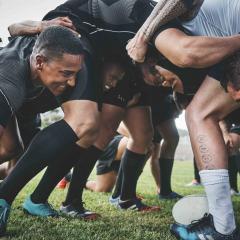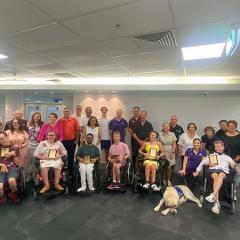In the lead up to Exercise Right Week, we want to shine the spotlight on a HDR (Higher Degree by Research) student within the School of Human Movement and Nutrition Sciences.
Recently, we caught up with Morgan Farley, Clinical Exercise Physiology PhD student, whose research investigates the relationships among inflammatory markers, body composition and six months of high-intensity interval training in breast, colorectal and prostate cancer survivors.
What inspired you to undertake a PhD?
When I finished University, doing more study was one of the last things I thought I would end up doing. However, after working for 12 months in the cancer industry I realised how many gaps in our knowledge there were. I also found that I kept asking questions around the mechanisms on how exercise could help my clients (people with cancer) and what was the best dose of exercise to give them.
I would spend hours trying to find the answers, just to figure out they didn’t exist or most of the time it just raised more questions for me! I also feel passionately that there are significant gaps in the care and support the health system offers people that have been affected by cancer. I would like to help bridge that gap, and one of the best ways to do this is to produce evidence in favour of exercise!
What are your key research interests?
Exercise oncology is my key research interest, as well as anything to do with the immune system. Exercise has an integral role across the cancer continuum but is often overlooked. I find it fascinating how exercise can not only help with the more well-known benefits, such as improving fitness, body composition and mental health, but can also reduce risk of diseases like cancer and help improve survival. These physiological adaptations and changes that occur with each bout of exercise is what really sparks my interest. I am also very interested in the translation of some of the great research that the School of Human Movement and Nutrition Sciences is producing and implementing programs into hospital settings.
What is your PhD research project about?
My PhD is looking at the relationships among inflammatory markers, body composition and six months of high-intensity interval training in breast, colorectal and prostate cancer survivors. We will also look at the influence of training on the acute response of myokines to HIIT.
What do you enjoy most about being a PhD student?
What I have enjoyed most so far would be the opportunity to continue to learn and challenge myself. One thing I could almost guarantee for any PhD student, is that things won’t always go to plan, and you will certainly face a challenge or two but that is what makes it fun! These challenges have provided many learning curves and growth opportunities that I would never have been exposed to if it wasn’t for my PhD. I have learnt more in the past 3 years than I thought was possible and can confidently consider myself an expert within exercise oncology.
I have also been provided opportunities to develop skills or qualifications that I never thought I would need. For example I have been able to participate in DXA or phlebotomy courses, attended conferences on immunology, and consulted on the development of programs. I have also been provided various opportunities to further develop my skills by presenting at several conferences including ESSA and attending networking events. My time completing my PhD has really shaped me as a person and has provided me with a skillset I will continue to use throughout my career, along with some lifelong friends and mentors.
What is one piece of advice you would give to someone thinking about studying a PhD?
It isn’t a short-term commitment, so really think about both your career objectives and life values and make sure it fits, then make the most of every opportunity. This will help you when things start to get a little tough, as you can come back and remember why you are doing it.
What do you like to do in your spare time when you are not working on your PhD?
I love all forms of physical activity and the beach! I also spend a fair bit of time training for triathlons and have my own business Valere Health which focuses on exercise for people with cancer.
What are three words your fellow PhD students would use to describe you?
Driven, bubbly and passionate.
Where do you see yourself in 10 years?
That is a million-dollar question! I would love to still be teaching about exercise and cancer and having some form of role implementing exercise programs within acute settings for people with cancer.



